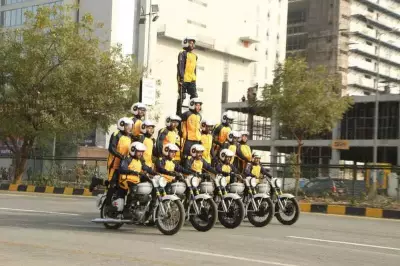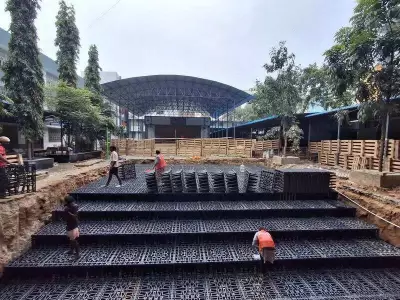
Two Shivamogga IS Module Members Sentenced to Six Years in Prison
A special National Investigation Agency (NIA) court in Bengaluru has delivered a significant verdict, sentencing two members of the Shivamogga Islamic State (IS) module to six years of rigorous imprisonment for their involvement in a 2022 terror conspiracy. The convicted individuals, Zabiulla (34) and Nadeem Faizal (29), both residents of Shivamogga, pleaded guilty to multiple terrorism charges.
Court Delivers Verdict on Multiple Terrorism Charges
The special court for NIA and terrorism cases convicted the two accused under sections of the Indian Penal Code for criminal conspiracy and multiple provisions of the Unlawful Activities (Prevention) Act (UAPA). The charges included sections 13, 16, 17, 18, 20, 38, 39, and 40 of the UAPA covering unlawful activities, terrorist conspiracy, terrorist acts, and membership in a terrorist organization.
In its order delivered on Friday, the court stated that the substantial sentences would run concurrently. The period of detention already undergone by the accused in judicial custody will be set off against their prison term as per Section 428 of the Criminal Procedure Code.
While Zabiulla and Nadeem Faizal have been convicted, ten other members of the same module have chosen to face trial rather than plead guilty. This group includes key accused in major terror cases:
- Abdul Matheen Taha (32) and Mussavir Hussain Shazib (32) - accused in the March 1, 2024 Bengaluru Rameshwaram Cafe blast
- Mohammed Shariq (27) - accused in the 2022 Mangaluru cooker blast case
International Connections and Handler Links
Investigations have revealed that the Shivamogga module was allegedly handled by Mohammed Shahid Faizal (42), a missing accused in a 2012 Bengaluru Lashkar-e-Toiba (LeT) terror conspiracy case. Faizal, currently based abroad, is suspected to have connections with multiple terror modules across India.
Security agencies suspect Faizal's involvement with the Kashmir doctors' module behind the November 10 blast near Delhi's Red Fort and the 2022 Coimbatore suicide bomb case. The similar modus operandi employed by these separate modules has raised concerns about coordinated terror activities.
According to NIA investigations, Zabiulla was radicalized and recruited by Mohammed Shariq, the prime accused in the Mangaluru cooker bomb blast. Shariq was allegedly transporting an explosive device in an autorickshaw when it accidentally detonated. Zabiulla subsequently radicalized his friend Nadeem Faizal, drawing him into the terror network.
Funding Through Cryptocurrency and Radicalization Evidence
The terror funding mechanism uncovered during investigations revealed sophisticated methods. The module received over Rs 5 lakh in cryptocurrency from handlers suspected to be based abroad. The foreign handler, identified online only as 'Colonel' (later identified as Shahid Faizal), transferred funds through crypto wallets to module members and their friends.
NIA probe details show that accused Syed Yasin received cryptocurrency deposits into the crypto wallet of his friend Mohammed Noorin Sharief and converted them into cash. Yasin allegedly transferred more than Rs 1 lakh into Mohammed Shariq's account.
Digital evidence gathered during investigation proved crucial. Scrutiny of Zabiulla's mobile phone revealed numerous images, speeches, and videos by leaders of PFI, SDPI, and ISIS radicalization content featuring Maulana Masood Azhar. The device also contained a video of wanted terrorist Farhatullah Ghauri (58), originally from Hyderabad and suspected to be in Pakistan. Security agencies report that Ghauri is the father-in-law of alleged module handler Shahid Faizal.
How the Terror Module Was Uncovered
The Shivamogga module came to light unexpectedly following a stabbing incident on Independence Day in 2022. Zabiullah was arrested for attempting to kill an innocent bystander, Prem Singh, a 20-year-old worker at a local silk clothing store, in a communal incident.
During questioning and analysis of his mobile phone, police discovered he had been receiving content about the Islamic State and instructions on making Improvised Explosive Devices (IEDs) using easily available materials. This discovery led police to Mohammed Shariq, who was subsequently considered an accused in both the stabbing case and a separate UAPA terror case.
Further investigation revealed that the group had purchased timer relay circuits from Amazon, batteries, switches, wires, match boxes, and other explosive materials in Shivamogga. The accused had successfully tested a bomb at Kemmangundi on the banks of Tunga river in Shivamogga district.
The Enforcement Directorate (ED) later launched a probe into the module's funding, particularly after the Rameshwaram Cafe blast execution in March 2024. The foreign-based handler had provided substantial cryptocurrency amounts to key members Abdul Matheen Taha and Musavvir Hussain Shazib, who were on the run for over four years before their capture in 2024.
This case represents a significant victory for Indian security agencies in dismantling terror networks while highlighting the evolving challenges of digital radicalization and cryptocurrency-based terror funding.





